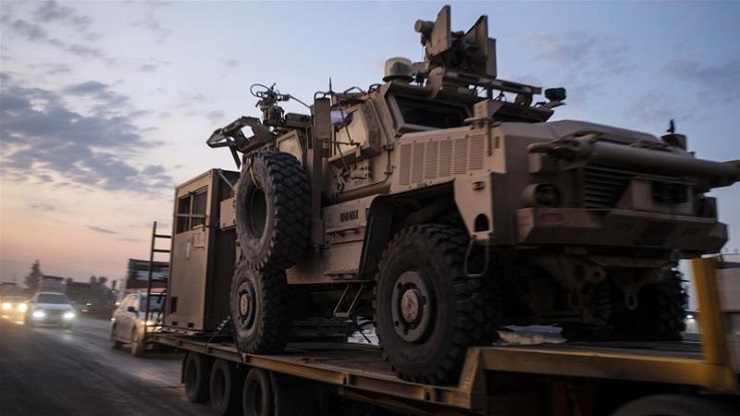Keeping to a long standing tradition of hawkishness US President Donald Trump, whose campaign ran on the promises of peace and conflict resolution, ordered the deployment of an additional 4000 troops to Kuwait in view of escalating tensions with Iran in neighbouring Iraq.
Just when we thought the region could not possibly become more volatile, the United States choose to light up a match by playing warlord against its designated nemesis: the Islamic Republic of Iran by challenging its standing in Iraq. Needless to say that the move aims to surgically diminish Iran’s geopolitical gravitas and cut Tehran’s growing regional network, the infamous Shia Crescent so many state officials warned would spell the end of all things green and fair …
Secretary of Defense Mark Esper took to Twitter on December 31st, 2019 to rationalise the move and for good measure blame Iran for the escalation in violence.
“This deployment is an appropriate and precautionary action taken in response to increased threat levels against US personnel and facilities, such as we witnessed in Baghdad today,” he wrote.
On December 31st, 2019 in the early hours of the morning, hundreds of supporters of the Kataeb Hezbollah an Iranian-backed militia organised under the PMU (Popular Mobilization Units) stormed the US Embassy compound in Baghdad, forcing the evacuation of the ambassador and his staff.
The attack followed a series of airstrikes December 29, 2019 against the aforementioned PMU Brigade after the US military claimed it is responsible for targeting America’s military interests in the country in the northern city of Kirkuk earlier in December 2019.
Iran has so far maintained its innocence, arguing that should it wish to target America, or any other country for that matter, it would do so openly, without the use of proxies.
Supreme Leader Ayatollah Ali Khamenei was quoted by media as saying that “if the Islamic Republic makes a decision to confront any country, it will do it directly.”
Just so we are all on the same page, I believe it would serve the purpose of this article to highlight the fact that Iraq is a sovereign nation and that as such the integrity of its borders and by extension its territory should NOT be breached by any one foreign power on account it fits their particular agenda. However one wishes to justify interventionism it flies in the face of international law and nations’ right to self-determine. Call me crazy but some lines should never be crossed and to peddle national security on foreign soil just does not, and more importantly should not stand.
And yet … here we are again, in the thick of what could fast turned out to be yet another Iraqi conflict. Why stop at 2 wars when one can start another, and yet still hold to the logic of democracy-building … or is it Terror fighting? One does get confused!
Lucky for us Washington is getting a tad predictable, that is not to say that anyone can do much about it. For all its neoconism, America has yet to be called out on its illegal war-mongering.
Steadily, and that since May last year (2019) the United States has steadily increased its military footprint in Iraq, by a whopping 14,000 troops – long before the troubled nation gave any sign of political unrest it serves to note, all under the rationale that Iran threatens the region’s stability.
Iraq today finds itself a victim of its friendships. Quite literally caught between a rock and a hard place, the very nation which survived the horrors of Islamic radicalism, courtesy of Daesh’s armies, will need now to wrestle not one but two superpowers to avoid becoming the next Iranian-American frontline.
But then again one could argue that Iraq is simply a victim of its own geography. Not that it makes things easier … it just offers some context to what many experts warned would happen in view of recent geopolitical developments. For every step outward Tehran took to consolidate its regional reach, Washington was bound to push in equal measure so that its neo-colonial legacy would survive, if not intact, grand enough to sustain its hunger.
And indeed … Trump’s America is pushing back, rather successfully, one might add.
Although any tangible gain against Iran in Iraq has yet to be manifested, cracks have begun to appear in what was once described as Iran’s backyard – Iraq’s Shia south. For the ties that unite them to Iran, many Shia Iraqis have begun to view Iran’s influence through the lense of political colonialism.
An article in Politico summarises the current situation rather well. It reads,
“The first sign that Iran was losing steam in Iraq came with the massive Shia protests against the Iraqi government and its Iranian patron. The corruption and incompetence of a government handpicked by Iran was not lost on the Iraqi demonstrators. They demanded representation and a clean government, which they understood could only come about if the Iranian influence receded.”
And, “America has too often viewed Iraq through a narrow sectarian lens and has assumed most Shias support Iran and Iraqi nationalism was a relic of the past. After decades of sectarian misrule, however, Iraqis are seeking unity at home and emancipation from Iran.”
Fears today are that America’s intervention against Iran’s regional interests in Iraq could lead to a partition of the nation-state into three separate entities: Kurdish-Iraq, Sunni-Iraq and the Shia South, thus putting some serious question marks as to the viability of the region altogether.
Catherine Shakdam is a research fellow at the Al Bayan Centre for Planning & Studies and a political analyst specializing in radical movements. She is the author of A Tale of Grand Resistance: Yemen, the Wahhabi and the House of Saud. She writes exclusively for the online magazine “New Eastern Outlook”.

